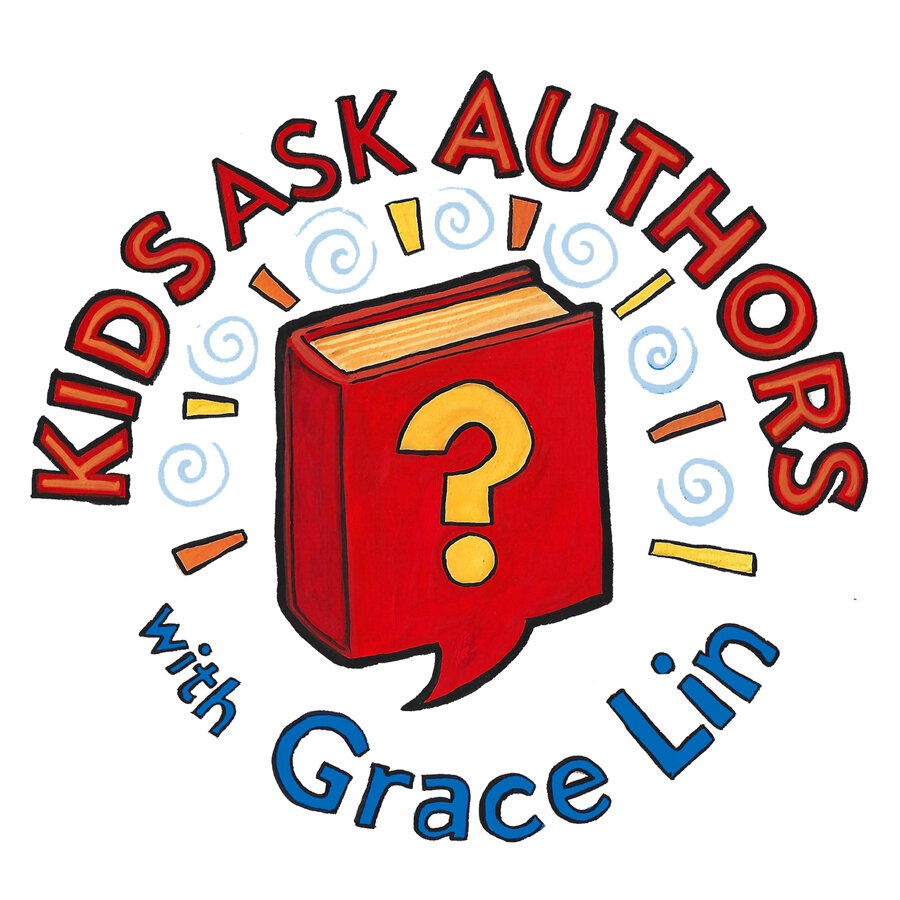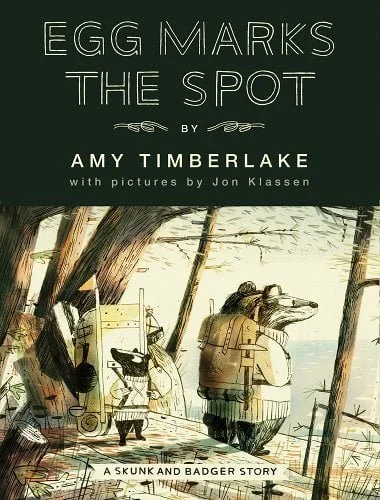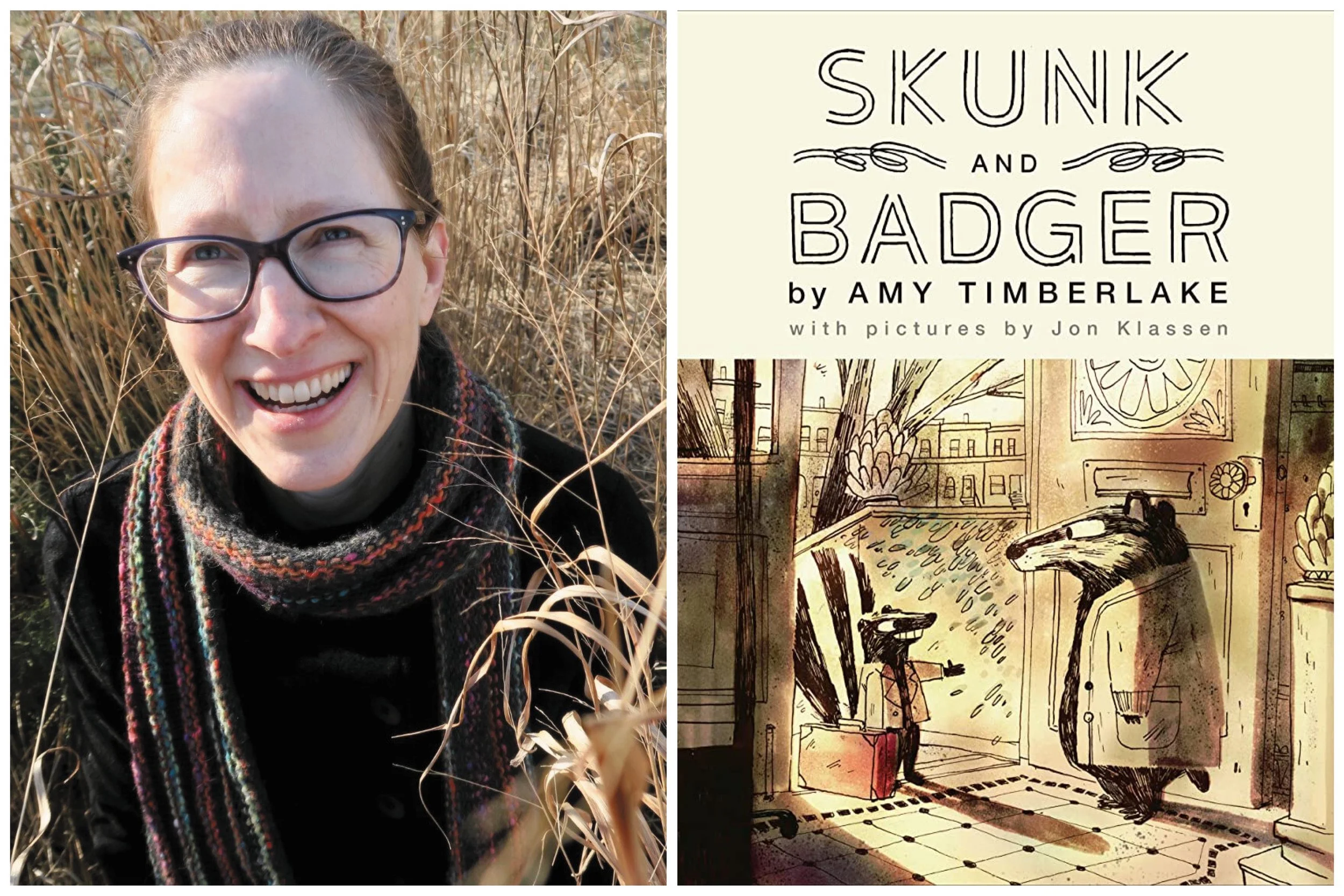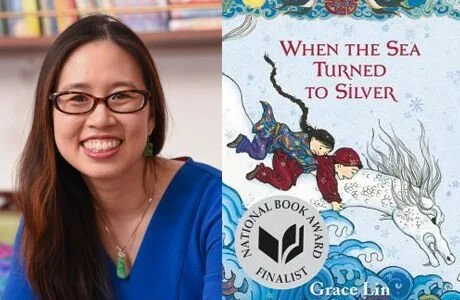Episode #152: Do you work on one book at a time or lots of books all at once? -with Amy Timberlake
Welcome back! On today’s episode, we welcome Amy Timberlake to answer this wonderful kid question: “Do you work on one book at a time or lots of books all at once?”
TRANSCRIPT:
Grace Lin: Hello, I'm Grace Lin, Children's book author and illustrator of many books including the middle grade novel, Where the Mountain Meets the Moon and the picture book, A Big Moon Cake for Little Star. Today I'm here with Amy Timberlake, the author of many books, including the middle grade novel, One Came Home, and what we'd like to call younger, middle grade, read aloud books like Skunk and Badger, Egg Marks the Spot, and the upcoming Skunk and Badger untitled book, which you'll have to stay tuned for. Welcome, Amy.
Amy Timberlake: Hey, thank you for having me.
Grace Lin: Thanks for coming on today. I'm so excited to be talking to you. Are you-
Amy Timberlake: So excited to be talking to you? It's very fun.
Grace Lin:... Ready for today's kid question?
Amy Timberlake: Yes.
Grace Lin: Okay. Today's kid question is from a person named Lucas, and Lucas asks, "Do you work on one book at a time or lots of books all at once?"
Amy Timberlake: This is an easy question for me because I work on one book at a time. I'd like to be able to work on many books at the same time, but the way my creative process works, it's always been one book at a time.
Grace Lin: Now are you thinking of other books while you are writing?
Amy Timberlake: Well, I do keep a notebook, which if you've talked or heard other writers talk, you've probably heard of. But I do keep a notebook and then when an idea comes to me, I just jot it down and I try to put in a place where I will not forget where it is. Which is pretty difficult because I think ideas come... There's just a lot of ideas out there in the ether and you just pull them down, you make lists and you go, maybe a week later you say, "Oh, that's not such a great idea. I don't really like that anymore. Or I'm not not interested in it." And I suppose that's how I choose which ideas... If a week later I'm looking at this idea and I'm thinking, "Oh, there's something there." It might not be what I wrote down exactly, but if I dug around and started writing and journaling, I'd probably find something in that little scrap.
Grace Lin: So even when you're writing books like Skunk and Badger and you have another book and another book coming up, do you think of what could happen in the next book while you're writing Skunk and Badger? Are you thinking about what's going to happen in Egg Marks The Spot? Or do you just start fresh after Skunk and Badger's all done?
Amy Timberlake: Well, I do have ideas of where that particular story could go, but the interesting thing is that it's not until I'm actually really in the weeds with a particular book that I really know how the plot will go.
And with these books, I've been surprised. I thought, because I had repeating characters through the books, I thought that it would be easier than my usual process. But what I've really found is that each book sort of demands its own shape and its own story in some way, and I really have to let the story take the shape that it wants to take. So it's a longer process than I actually have thought it would be initially. But I think it's good.
I also just like challenges and I've always been like that. So whenever I take on a new project, half of it is, "Oh, I've always wanted to try this thing." And usually there's something new about it. So it just means that I feel like an amateur when I go into it pretty much every time I'm like, "Oh, I have a lot to learn here."
Grace Lin: That's so interesting how you say like, "Oh, there's something I was interested, something I wanted to try." Was there something like that with Skunk and Badger that you, I keep going to Skunk and Badger because that's the one-
Amy Timberlake: Yeah.
Grace Lin: ... That the kids in my book review club have read. But was there something in Skunk and Badger that made you think, "This is something I'd like to try or do?"
Amy Timberlake: Yeah. Well initially, I mean the start of Skunk and Badger might have been, it was a while ago, but it's things like Nate the Great. Love, Nate the Great and very specific voice in In Nate the Great. And I wanted to write a really slimmed-down story, and that was part of it. And then I was doing research for another book that was going to be an older middle grade. And I was reading all these books about bears and I'm talking about the animal bear.
So I was reading bear fairy tales and bear everything, and I was reading all these kids books that had bears as characters. And I read Winnie the Pooh, and as I was reading Winnie the Pooh, which is written by A.A. Milne, which was written... It was just so beautifully crafted.
Grace Lin: Yeah.
Amy Timberlake: There were these little nuggets of stories. And I started thinking, well, Amy, what would happen if you tried to write a story that is like that, that is really, it's slimmed down, there aren't any extra words, but it's so carefully crafted. Each moment is important. It looks effortless. I mean, at least A. A. Milne made it look effortless. And I wanted my story to feel as effortless as possible, anyway, I don't want to compare myself to A.A. Milne because that's just an impossibility. Oh my gosh.
Grace Lin: That's not true.
Amy Timberlake: But that was kind of the thing that I was thinking about. I was thinking about A.A. Milne, just how carefully crafted, and also Nate the Great. So that's sort of where it started, and I tried to get to that tone.
Grace Lin: Yeah. Well, speaking of Tony, you mentioned a little bit right before we put the recording on about how you wanted to make a book that would be for reading aloud. Could you want to talk a little bit about that?
Amy Timberlake: Well, I loved reading aloud, Winnie the Pooh. So it's a natural transition from that. And then when I was working on Skunk and Badger I imagined a gathering of a lot of people, perhaps at a holiday in a room and somebody is reading a story and there would be 80-year olds and there would be three-year-olds, and there would be people in their 50s and people in their 30s and 20s, and they're all listening to the story. You don't want it to go on forever, but you want the story... And so I was imagining that room, and then I was imagining the person reading it, and I thought, wow, you know what would be really great is if in every sentence you knew how to say all the dialogue before you got there. So you could read this book the first time through and sound like an expert storyteller.
So I put in all the sound effects where I thought they would go if you were reading it out loud. And I tried to do all the dialogue so that there were clues before you hit the dialogue of how you were supposed to say the line. Because that's one of my pet peeves is when I'm reading aloud and I read dialogue for a character and I've interpreted it completely wrong and the theme changes, then you know, actually have to go back and read it the right way, otherwise the scene doesn't work.
So I thought, "Oh, I'd really like to try that." So these were some of the challenges that I was trying to work on. I don't know if I've a hundred percent succeeded, but it was fun to do it and it was really fun to write sound effects. I just think that is just fun. And I think every writer should just put sound effects in their books because every time you put down a can, you should hear that thing go tong. I just think you should hear it. So it's very fun. It was a fun challenge.
Grace Lin: Well, I love what you say about read aloud because I feel like I approach my writing in a similar way, not so much read aloud being... I like how you said the perfect storyteller. I don't really approach it in that way though. Now I have a new challenge be like, okay, when they read aloud, they sound like the perfect storyteller, but I always thought of it. I'm going to write it. Someone is speaking it.
So, hmm, I know that sometimes I remember once reading an Amazon review of my book, and it was critical because it was saying, I can't remember how I had put it, but they said, "Who would write that?" And I was like, "Well, nobody really writes that. That's how you say it if you were telling the story-"
Amy Timberlake: Yeah.
Grace Lin:... "You repeat that part again," and that's why I did it that way is because you would repeat it as a storyteller. But no, I guess as a writer it does seem like writing itself, without reading it aloud, it does seem repetitive. So that's why.
Amy Timberlake: But you're right. I mean, that's the way people talk. People repeat themselves all the time. Actually, I mean, seriously, you and David Mamet should have a total conversation. I think you're going to have a meeting of the minds. I mean, have ever heard David Mamet's play's? They're very repetitive. People just keep saying the same thing and then they go, "I said that, but I said that." I'm not doing a good example, but it really works. He's right.
Grace Lin: I don't want to be too repetitive. But yes, but I think it's because I'm trying to emulate that storytelling sensibility that we had, that for me, folk tales originally were passed down that way. So I was trying to kind of mimic that kind of style, which was kind of to be repetitive in certain areas. So I guess me and David Mamet have some things to talk about.
Amy Timberlake: Exactly, yes.
Grace Lin: All right. Well thank you so much Amy, for coming on today's podcast and thank you so much Lucas, for asking such a great and interesting question.
Amy Timberlake: Thank you, Grace. Thank you Lucas. Bye.
Grace Lin: Bye.
Today’s KID BOOK REVIEW comes from Eliot! Eliot is reviewing Amy Timberlake’s The Egg Marks the Spot.
The book I would like to review is Egg Marks the Spot by Amy Timberlake, with illustrations by Jon Klassen. The book is about two friends, Skunk and Badger. When Skunk finds out that an old adversary is coming to visit, he decides that he and Badger should go on a trip to the endless lake, where Skunk can get away from town, and Badger, a geologist, can look for an agate to finish his rock collection. But Badger finds out that there’s more to this trip when his cousin, who dislikes him appears, and a hen reveals something that shouldn’t exist. I liked this story because of the vivid imagery, and the detailed pictures. They made me understand the settings and characters better. Overall, Egg Marks the Spot is interesting, hilarious, and is a good read for anyone in the mood for a laugh.
Thank you so much Eliot!
More about today’s authors:
Amy Timberlake received a Newbery Honor, an Edgar, and a Golden Kite Award. She’s had books on the Indie Books Bestseller list, one book was Tattered Covers’ Book of the Year, and reviews have appeared in the New York Times Book Review, The Sunday Times, The Irish Times, Milwaukee Journal-Sentinel, Christian Science Monitor, People Magazine,The Sydney Morning Herald, and also on various radio programs and podcasts. It delights Amy that the Skunk and Badger stories are being translated into fifteen languages. Also, Chicago's Lifeline Theatre has adapted both One Came Home and The Dirty Cowboy for the stage. She's received residency fellowships from Hedgebrook, and The Anderson Center. Amy’s work is represented by Steven Malk at Writers House.
Amy grew up in Hudson, Wisconsin. She attended Mount Holyoke College and majored in History. She also holds an M.A. in English/Creative Writing. Most of the time, she can be found in Chicago, where she lives with her husband. But on especially good days she can be found walking on a long, long trail. One of her favorites? This one in England.
Grace Lin, a NY Times bestselling author/ illustrator, won the Newbery Honor for Where the Mountain Meets the Moon and her picture book, A Big Mooncake for Little Star, was awarded the Caldecott Honor. Grace is an occasional commentator for New England Public Radio , a video essayist for PBS NewsHour (here & here), and the speaker of the popular TEDx talk, The Windows and Mirrors of Your Child’s Bookshelf. She is the co-host of the podcast Book Friends Forever, a kidlit podcast about friendship and publishing (geared for adults). Find her facebook, instagram , twitter ( @pacylin) or sign up for her author newsletter HERE.
All my books: https://shop.carlemuseum.org/category/books/autographed-books/grace-lin
Girl Scout Cookies!
Help Grace's daughter reach her girl scout cookie selling goal! Purchase cookies:



